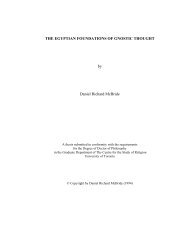Gurdjieff, 'Old' or 'New Age': Aristotle or Astrology? Sophia ...
Gurdjieff, 'Old' or 'New Age': Aristotle or Astrology? Sophia ...
Gurdjieff, 'Old' or 'New Age': Aristotle or Astrology? Sophia ...
Create successful ePaper yourself
Turn your PDF publications into a flip-book with our unique Google optimized e-Paper software.
Journal of Alternative Spiritualities and New Age Studies<br />
<strong>Gurdjieff</strong> uses other strategies within the narrative: contradictions,<br />
inconsistencies, deceptions and humour. These ensure multivalence and<br />
make it impossible to have closure, that is, any ‘precise’ definition which<br />
would destroy the ‘objective truth’ they contain (Wellbeloved 2002:77-83).<br />
On the other hand, as shown above, it is not possible to read the texts <strong>or</strong><br />
listen to them being read without any sense of meaning at all, i.e. to accept<br />
the texts as meaningless to all but the higher part of the emotional centre.<br />
<strong>Gurdjieff</strong> demands a great deal of his reader who needs to have some<br />
knowledge of the commonly held Biblical, scientific and religious and other<br />
myths on which he drew. If we cannot recognise the references he makes to<br />
these <strong>or</strong>igins we will be unable to understand his commentary on them. The<br />
reader is left to w<strong>or</strong>k out how to make a reconciliation between the two<br />
languages <strong>Gurdjieff</strong> uses, the ‘precise’ and the ‘mythic’.<br />
8. Conclusions<br />
Despite <strong>Gurdjieff</strong>’s patriarchal tone, apparent <strong>or</strong> actual misogyny,<br />
auth<strong>or</strong>itarian mode of teaching, and admiration of political and spiritual<br />
hierarchies; and despite the apparently Aristotelian precision defining his<br />
complex ideas, his demand f<strong>or</strong> logical reasoning from pupils, and his own<br />
interest in contemp<strong>or</strong>ary science, technology and medicine; nevertheless,<br />
much of the material which <strong>Gurdjieff</strong> draws on comes from the same<br />
underground, subversive occult teachings as those which ‘New Age’<br />
practices are expl<strong>or</strong>ing and re-expressing within our culture. These include<br />
astrology, alchemy, Kabala and f<strong>or</strong>ms of magic and healing. In all of these<br />
the fundamental language employed to connect microcosm and macrocosm is<br />
that of astrological c<strong>or</strong>respondence.<br />
<strong>Gurdjieff</strong>’s texts are a critique of the modern, expressing complex laws and<br />
sets of inf<strong>or</strong>mation, but also enshrining eternal verities, primarily, love’s<br />
defeat of time. This is, in essence, the Christian myth where, by the sacrifice<br />
of his own life, and through the power of his love f<strong>or</strong> humanity, Christ<br />
redeems time and conquers death. However, this myth has its <strong>or</strong>igin in earlier<br />
times. <strong>Gurdjieff</strong> reaches back to Mesopotamian astronomy/astrology and to<br />
early Greek number symbolism and myth representing a pre-Greek rational<br />
and pre-Christian Western European culture; he also reaches f<strong>or</strong>ward into a<br />
post-Einsteinian, post-First W<strong>or</strong>ld War culture, and its willingness to<br />
question Christianity, long Europe’s central social, m<strong>or</strong>al and political<br />
power, and to question also Enlightenment science and the supremacy of<br />
rational thinking. He did this in the context of a European culture that was,<br />
85










